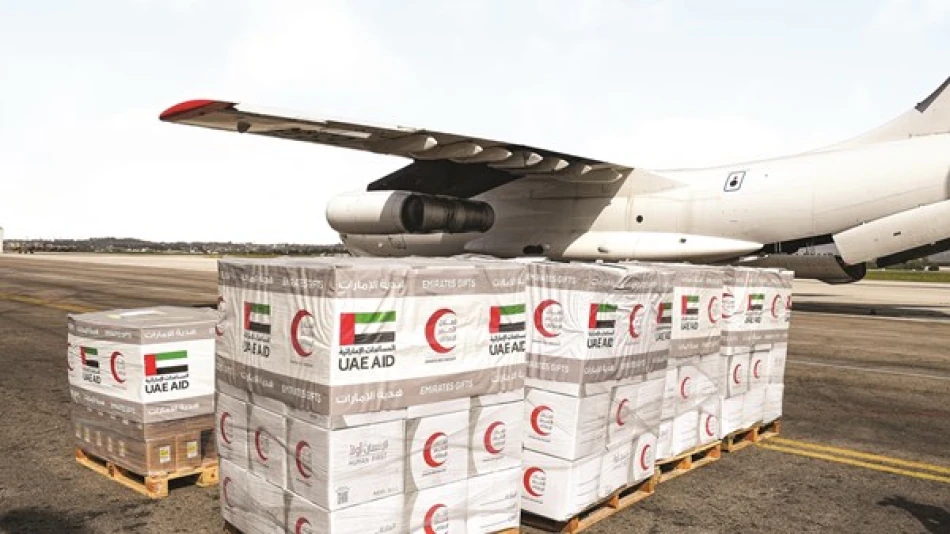
UAE: A Global Beacon of Charitable Impact
UAE Emerges as Global Philanthropy Powerhouse with $98 Billion in Aid Since 1971
As the world marks International Day of Charity, the United Arab Emirates stands out as a rare success story in transforming oil wealth into sustained humanitarian impact. With over $98 billion in foreign aid distributed to 140+ countries since 1971, the UAE has institutionalized giving in ways that offer lessons for other wealthy nations seeking meaningful global influence beyond military or economic power.
The Zayed Legacy: From Desert Vision to Global Humanitarian Hub
The UAE's philanthropic approach traces back to founding father Sheikh Zayed bin Sultan Al Nahyan, who established giving as a cornerstone of both domestic and foreign policy. Unlike many resource-rich nations that struggle with the "resource curse," the UAE channeled its wealth into systematic humanitarian infrastructure from its earliest days.
Under current President Sheikh Mohamed bin Zayed Al Nahyan, this approach has evolved into what analysts call "humanitarian diplomacy" – using aid strategically to build soft power while addressing genuine global needs. The model has proven particularly effective during crises, positioning the UAE as a reliable partner for international organizations and disaster-struck nations alike.
Institutional Architecture: Beyond Checkbook Diplomacy
Specialized Agencies Drive Strategic Impact
Rather than ad-hoc giving, the UAE has built a sophisticated institutional framework. The International Humanitarian Affairs Council, overseen by Sheikh Dhiyab bin Mohamed bin Zayed Al Nahyan, coordinates the country's global humanitarian portfolio through multiple specialized agencies.
Key institutions include the Zayed Foundation for Charitable and Humanitarian Works, operating since 1992 across 188 countries, and the Khalifa bin Zayed Al Nahyan Foundation, which has focused on education, healthcare, and long-term development projects since 2007. The Emirates Red Crescent Authority handles emergency response, while the Mohammed bin Rashid Al Maktoum Charitable Foundation targets youth empowerment and disability support.
Technology-Driven Transparency
The UAE has addressed a chronic problem in international aid: accountability. Smart digital platforms now allow donors to track contributions and verify delivery to beneficiaries. Artificial intelligence and big data analytics help identify the most vulnerable populations and design targeted interventions – an approach that could revolutionize how humanitarian aid operates globally.
The Numbers Tell a Compelling Story
In 2023 alone, UAE foreign assistance totaled $3.2 billion, with humanitarian aid reaching $1.3 billion – triple the previous year's amount and representing 42% of total assistance. This surge reflects the country's response to multiple global crises, from Syrian refugees to COVID-19 vaccine distribution to dozens of nations.
The scale becomes more impressive when measured against GDP. The UAE consistently ranks among the world's top donors relative to national income – a metric that reveals genuine commitment rather than surplus wealth disposal.
Strategic Implications: Soft Power in Action
Regional Influence Through Humanitarian Leadership
The UAE's giving strategy serves multiple purposes beyond altruism. In a region often associated with conflict and instability, the Emirates has carved out a distinctive identity as a constructive force. This positioning has proven valuable in mediating regional tensions and attracting international partnerships.
Unlike traditional powers that project influence through military bases or economic coercion, the UAE has built relationships through crisis response and development partnerships. This approach has opened doors across Africa, Asia, and beyond – creating goodwill that translates into diplomatic, trade, and security benefits.
Comparison with Global Peers
The UAE model contrasts sharply with other wealthy nations' approaches. While countries like Norway and Denmark achieve high per-capita giving through government programs, and the US dominates in absolute terms, the UAE combines substantial resources with institutional innovation and rapid response capabilities.
Singapore offers perhaps the closest parallel – a small, wealthy nation using strategic generosity to build outsized global influence. However, the UAE's focus on humanitarian rather than purely economic development sets it apart.
Domestic Foundation: Charity Begins at Home
The UAE's international credibility rests partly on robust domestic programs. Local initiatives support struggling families, orphans, and people with disabilities while promoting volunteer culture among youth. This internal focus prevents the criticism often leveled at countries that give generously abroad while neglecting domestic needs.
Federal Law No. 3 of 2021 regulates charitable fundraising and oversight, ensuring transparency and preventing misuse – addressing concerns that have plagued charitable sectors in other Gulf states.
Innovation in Humanitarian Action
The UAE's approach to modern challenges showcases how traditional philanthropy can evolve. During the COVID-19 pandemic, the country didn't just write checks – it leveraged its logistics capabilities, medical expertise, and diplomatic networks to deliver vaccines and supplies globally.
This operational capacity, built through decades of humanitarian work, now positions the UAE as a go-to partner for rapid crisis response. International organizations increasingly view the Emirates not just as a donor but as an implementing partner with unique capabilities.
Measuring Success: Beyond Dollar Figures
The UAE's philanthropic success transcends financial metrics. The country has built genuine soft power, created a distinctive national identity, and demonstrated how smaller nations can achieve global influence through sustained, strategic generosity.
More importantly, this approach has created a sustainable model that doesn't depend on individual leaders or temporary wealth. The institutional framework and cultural integration of giving suggest the UAE's humanitarian role will outlast current leadership and economic cycles.
As wealthy nations worldwide grapple with how to translate economic success into meaningful global contribution, the UAE's five-decade experiment in systematic philanthropy offers a compelling blueprint. The model proves that strategic generosity, properly institutionalized, can serve national interests while genuinely improving lives across the globe.
Most Viewed News

 Layla Al Mansoori
Layla Al Mansoori






